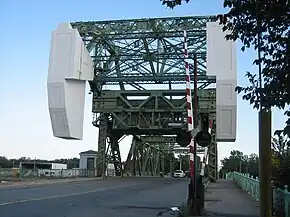Cherry Street Strauss Trunnion Bascule Bridge
The Cherry Street Strauss Trunnion Bascule Bridge is a bascule bridge and Warren truss in Toronto, Ontario, Canada.[1] Located in the industrial Port Lands area, it carries Cherry Street over the Toronto Harbour Ship Channel and opens to allow ships to access the channel and the turning basin beyond. There are two bascule bridges on Cherry Street. The other, smaller bridge, crosses the Keating Channel, while this bridge crosses the Ship Channel.
Cherry Street Strauss Trunnion Bascule Bridge | |
|---|---|
 The Cherry Street Bascule Bridge | |
| Coordinates | 43°38′29″N 79°20′56″W |
| Carries | vehicular and pedestrian |
| Crosses | Toronto Harbour Shipping Channel |
| Locale | Toronto |
| Other name(s) | Cherry Street Bridge |
| Owner | Ports Toronto |
| Maintained by | Ports Toronto |
| Heritage status | |
| Type | listed |
| Designated | February 25, 1992 |
| Characteristics | |
| Design | Bascule |
| Material | Steel |
| Total length | 120 metres (390 ft) |
| Width | 20 metres (66 ft) |
| Height | 48 metres (157 ft) |
| Longest span | 40 metres (130 ft) |
| Clearance above | (?) Clearance above the deck |
| Clearance below | No limit when the bridge is open (Toronto Harbour Ship Channel) |
| History | |
| Architect | Joseph Strauss |
| Constructed by | Dominion Bridge Company |
| Construction end | 1930 |
| Construction cost | CA$500,000 |
| Location | |
The bridge was built in 1930[1] by the company of Joseph Strauss and the Dominion Bridge Company. The north side of the bridge has 750-ton concrete counterweights that allow the bridge to pivot to open. The bridge uses 500 tons of steel in its construction.[2] The bridge is designed to carry two lanes of traffic. It cost CA$500,000 ($8.63 million in 2021 dollars)[3] to build.[2] It was officially opened on June 29, 1931 by Toronto Mayor William Stewart.[2] The bridge was listed under the Ontario Heritage Act by the City of Toronto in 1992 as architecturally historical.[4]

The city spent CA$2.5 million to refurbish the bridge in 2007.[5] The Toronto Port Authority made further repairs from December 2012 to September 2013 at a cost of CA$2 million.[6]
In 2021 the City entered into a funding agreement with PortsToronto (the "Owner") for the rehabilitation of the Cherry Street Ship Channel bridge approach spans and the Bascule bridge along with the authority to fund, from the approved 2021-2030 Transportation Services Capital Budget, the costs of the design and construction of these works, expected to total approximately $22.0 million over a period expected to be 2021-2025. In addition, and during the same timeframe, PortsToronto will rehabilitate the bridge's lifting mechanisms (mechanical and electrical) at a total cost of approximately $12.0 million. As of fall 2023, the City work on the approaches and 'foundations' was almost complete and in 2024 it is expected that the metalwork will be repaired and repainted.
References
- Kuitenbrouwer, Peter (September 13, 2013). "After nine months of repairs this Toronto bridge is finally open for business again, sort of". National Post. Retrieved September 15, 2013.
- Toronto Harbour Commission Public Affairs Department 1985, p. 51.
- 1688 to 1923: Geloso, Vincent, A Price Index for Canada, 1688 to 1850 (December 6, 2016). Afterwards, Canadian inflation numbers based on Statistics Canada tables 18-10-0005-01 (formerly CANSIM 326-0021) "Consumer Price Index, annual average, not seasonally adjusted". Statistics Canada. Retrieved April 17, 2021. and table 18-10-0004-13 "Consumer Price Index by product group, monthly, percentage change, not seasonally adjusted, Canada, provinces, Whitehorse, Yellowknife and Iqaluit". Statistics Canada. Retrieved April 17, 2021.
- "Cherry St". Toronto Heritage Properties Inventory. City of Toronto. Archived from the original on 2012-03-07. Retrieved 2009-02-16.
-
"That Old Blue Bridge". Unknown Victoria. 2009-08-27. Retrieved 2012-03-26.
Steel bridges, especially ones with intricate latticework like ours, contain thousands of difficult-to-reach joints, often hiding corrosion that's accelerated by salty air. Repairing and repainting such bridges is an ongoing headache, especially compared to ones made of concrete. Nevertheless, some places re-invest in their old steel bridges. Toronto refurbished its Cherry Street Bridge for $2.6 million in 2007, and recently Boston and San Francisco spent tens of millions renovating their Strauss drawbridges as well.
- Kuitenbrouwer, Peter (September 13, 2013). "After nine months of repairs this Toronto bridge is finally open for business again, sort of". National Post.
- Bibliography
- Filey, Mike (1998). Discover & explore Toronto's waterfront: a walker's, jogger's, cyclist's, boater's guide to Toronto's lakeside sites and history. Dundurn Press. ISBN 978-1-55002-304-6. OCLC 39678576.
- Toronto Harbour Commission Public Affairs Department (1985). Toronto Harbour – The Passing Years. Toronto, Ontario: Toronto Harbour Commissioners.
External links
 Media related to Cherry Street Strauss Trunnion Bascule Bridge at Wikimedia Commons
Media related to Cherry Street Strauss Trunnion Bascule Bridge at Wikimedia Commons